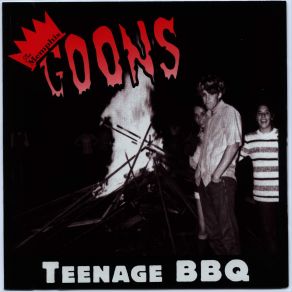Teenage BBQ
Download links and information about Teenage BBQ by Memphis Goons. This album was released in 1996 and it belongs to Rock, Psychedelic genres. It contains 17 tracks with total duration of 01:05:49 minutes.

|
|
|---|---|
| Artist: | Memphis Goons |
| Release date: | 1996 |
| Genre: | Rock, Psychedelic |
| Tracks: | 17 |
| Duration: | 01:05:49 |
| Buy it NOW at: | |
| Buy on iTunes $9.99 | |
Tracks
[Edit]| No. | Title | Length |
|---|---|---|
| 1. | Bring the House Down | 3:22 |
| 2. | Paulie's Toys | 3:29 |
| 3. | Indian Giver | 2:22 |
| 4. | Snow White | 2:21 |
| 5. | San Antonio Desert | 5:31 |
| 6. | Oh, Morning Time | 3:02 |
| 7. | Tootin' in America | 3:29 |
| 8. | See Her Face in the Mirror | 2:48 |
| 9. | Children of Danger | 3:11 |
| 10. | In my New Car | 2:49 |
| 11. | Wheels/The Brazen Man | 4:29 |
| 12. | Mood Music | 4:04 |
| 13. | Sweet Lover | 4:38 |
| 14. | Baby, Let's Bathe in Tang | 4:37 |
| 15. | Teenage BarBQ | 6:47 |
| 16. | Overton Park | 5:06 |
| 17. | Here Comes My Baby/Oh, My Sweet Wine | 3:44 |
Details
[Edit]There's not an ounce of hyperbole in saying the world was not ready for Teenage BBQ when it was originally recorded between 1971 and '73. Rock fans wowed by the polish of Led Zeppelin and Grand Funk Railroad couldn't care less about of a bunch of geeky joes recording themselves in their basement. Lo-fi and its proponents, such as Pavement, Sebadoh, and Guided By Voices, were 20 years in the offing. But lo-fi is indeed what Teenage BBQ is, full of tape hiss, tinny guitar, and plenty of do-it-yourself gumption, which is why these tapes found no label for release until 1996. To be sure, the musicians — piano player Robert Hull (also know as Xavier Tarpit), guitarist/bassist Phil Jones (aka Wally Moth), and guitarist/bassist Mike Lantrip (aka Jackass Thompson) — occasionally tip their hands to reveal key influences. "Bring the House Down" is a rave-up rocker befitting a group from Memphis, and the title alone of "Baby, Let's Bathe in Tang" points to a strong affinity for Captain Beefheart. But more often than not, the Goons are off in their own world. Behind the mic, none of these players sound like the teens they actually were. "Sweet Love" is a dark story of miscarriage and resentment underscored by Lantrip's alternately fuming and furious guitar, while "Chop Chop Chop" is a portrait of a loser lumberjack named Harvey. And how do you explain a song like "San Antonio Desert," in which Lantrip describes the sad and wacko existence of a paraplegic — or "parapelic" in the singer's parlance — stuck in the "Sanny Antonio" desert (San Antonio is actually un-parched), with Hull pounding out a hypnotic piano rhythm that sounds like it was stolen from North Mississippi hill country? This is standout stuff, and two decades ahead of time.